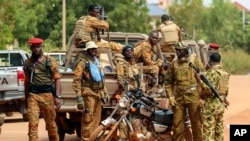The United States “recognizes Africa as a major geopolitical force and seeks to be a partner on shared values and interests,” said Assistant Secretary of State for African Affairs Molly Phee in recent Congressional testimony.
The recent coups in the Sahel can be attributed to the enormous challenges facing the region, notably a tradition of weak democratic governance, an acute terrorist threat, and insufficient economic and educational opportunities for the region's young population.
“We are adapting our response to these coups to promote responsive governance,” explained Assistant Secretary Phee:
“For example, following the July military coup in Niger, we suspended nearly 140 million in security assistance programs, more than 300 million in our MCC [Millennium Challenge Corporation] Compact and our security cooperation. To bolster the regional African body known as ECOWAS, which shares our alarm at the proliferation of coups, we are actively supporting their negotiations with the junta in Niger by enabling them to leverage our assistance to craft actionable terms for a democratic transition timeline and for the release of former President Bazoum.”
The United States remains steadfast in its support for the people of Niger by maintaining humanitarian health and essential food programing.
The prospects for the return of democracy in Mali are increasingly grim, said Assistant Secretary of State Phee, as the Wagner-supported transitional government once again has chosen to delay elections and is forcefully seeking to exert control in northern Mali.
“The deterioration in security, the rise in civilian casualties, and the exploitation of the country's natural resources illustrate convincingly the dangers of the Wagner role,” she said.
Burkina Faso is facing a dramatic security and human rights crisis, said Assistant Secretary Phee:
“We are urging the Burkinabe to employ a counterterrorism strategy that prioritizes civil security institutions. We know an overly militarized approach to counterterrorism, like the one adopted in Mali, is bound to fail. To address Burkina’s ongoing political instability, we are pressing for a democratic transition in line with a publicly declared timeline.”
“As we support our African partners in navigating these challenges,” said Assistant Secretary Phee, “we believe leading with our values will best support our national security strategy.”






